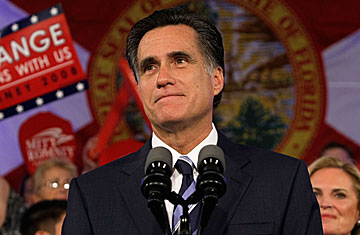
Republican presidential hopeful Mitt Romney speaks after coming in second in the Florida primary.
From the start, Mitt Romney had a clear strategy for winning the White House. He would run as the candidate of the ideological establishment, the Republican old-guard, the coalition of Ronald Reagan, with that three-legged stool of social, fiscal and national security conservatism. He would become the inside man in a presidential field filled with outsiders.
So Romney played in nearly every early straw poll, and pandered to each conservative demographic. He joined the NRA. He talked tough on illegal immigrants, and became a crusader against gay marriage. "Strength" was his watchword. With an impressive gallery of high-profile endorsements, he was the only Republican candidate who seemed to be on the right side of nearly every issue for the plurality of the old GOP coalition.
And yet, his candidacy sputtered. His narrow loss Tuesday to John McCain in Florida was just the latest in a series of disappointments that began in Iowa and New Hampshire, two states where he had outspent his rivals and once led in the polls. His failures have many causes, which will be raked over by historians. But they also suggest a broader shift: Romney may be running to lead a Republican Party that no longer exists.
As has become increasingly clear, the ideological coalition Romney so eagerly courted no longer controls the fate of the GOP, at least in the early voting states — which have favored Mike Huckabee, a populist who trumpets the occasional role of larger government, and John McCain, a legislative maverick who does not always play by the Republican rulebook. Romney tried to run as the establishment candidate, only to find that the establishment no longer held the power.
The Romney campaign, humbled by recent defeats, now hopes to rebrand his insider strategy as an outsider one. As the candidate soldiers on to the 21 states that will vote on February 5, the campaign holds out hope that the old coalition can be reborn anew. "We feel as though the conservatives are beginning to rally around Mitt," said Ann Romney, after her husband delivered an upbeat concession speech Tuesday night, in a downtown St. Petersburg theater.
A few minutes earlier, and a couple dozen feet away, Jay Sekulow, a senior advisor to the campaign, put it this way. "Conservatives have a choice now, and it's a clear choice," he said. "You have got a conservative and you have got John McCain, who does not take conservative positions on a lot of issues."
Downstairs, in the theater's press filing room, Al Cardenas, a Washington lobbyist who chaired Romney's Florida campaign, continued in the same frame of reference. "We think that the conservative movement activists are now beginning to panic about losing their grip on the Republican Party," Cardenas said. "They better start working hard, and they have told us they are going to have to start working hard."
The new Romney strategy has two clear components. First, the campaign is determined to marginalize Huckabee, who continues to poll well in many southern states, bleeding off votes from the vital socially conservative leg of the Romney's stool. "Huckabee has proven he can't win in the south," said Eric Fehrnstrom, Romney's spokesman. "People are going to realize that this is a two person race right now," said Sekulow.
Second, Romney will spend much of the next week trying to drum up old conservative distrust of McCain, who leaves Florida with considerable momentum and already-high poll numbers in many of the states that vote on February 5. Though McCain has been hammered by some conservative voices, such as the radio host Rush Limbaugh, he has so far escaped the full ideological revolt that greeted him in 2000, when he lost the nomination to George W. Bush.
This final Romney gambit is likely to determine more than just the fate of one, well-heeled candidate. It could set the course for the Republican Party. In the old days, those who supported tax cuts for the wealthy worked closely with those who wanted to amend the constitution to ban gay marriage. Those who wanted to grow the size of the military made common cause with those who saw global warming as an environmentalist scare-tactic meant to interfere with free markets. Those who wanted to overturn Roe v. Wade also wanted to overturn campaign finance reform.
McCain, Huckabee and a nation of disconcerted Republican voters now threaten to reformulate that coalition. Romney is certainly not a lifelong member of the old conservative movement. But as it stands, he may be the only thing left to hold it together.
